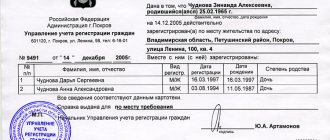Until the child is 6–8 years old, parents should worry about which school they will send him to.
It is important to understand that in each region of our country specific buildings are assigned to schools.
And when enrolling children in the first grade, the school administration is obliged, first of all, to admit the children to the school to which they belong on a territorial basis.
But how can you find out which school the house at your address belongs to? After all, it often happens that schools are located next to each other, and parents begin to get lost and wonder which educational institution to enroll their child in?
Why tie a school to specific houses?
The Law of the Russian Federation “On Education” states that residential properties must be tied to specific educational institutions. This is done in order to:
- Children living near the school could attend the educational institution freely and easily, so that they did not have to waste time traveling to school.
- Children could receive a quality education. The convenience (proximity) of the school's location is an important factor for the further progress of children.
- The load on educational institutions should be distributed evenly. If there were no such territorial distribution, then schools with a large rush of students would appear, and there would also be institutions where there would be a shortage of students.
Benefits when enrolling in schools
In every subject of the Russian Federation there are benefits for admitting children to educational institutions. It is better to check the list of such with the relevant department of education.
As a general rule, beneficiaries include children:
- military personnel;
- judges;
- prosecutors;
- police officers;
- parents of those injured and killed in the line of military duty;
- parents who were injured, injured or killed in the performance of official duties.
Assigning children to such categories assumes that, regardless of their registration (place of permanent registration), they will be enrolled in the chosen school.
Some regions of our country may be considered beneficiaries:
- children of single mothers;
- children who are under guardianship;
- children whose parents are deprived or have limited parental rights;
- large families;
- low-income families, etc.
If schools have preschool courses, then those children who are their graduates can be primarily enrolled in this educational institution.
See how to find out a person's address by full name. How long does it take to register at the passport office? Find out in the article.
Registration of a foreign passport through the MFC speeds up the procedure. Read more here.
How can I find out which school my child is registered in in 2021?
There are several ways to determine a child’s territorial affiliation with a particular school.
Method 1. Find out information on the official website of the educational institution
If there is not one, but two or three schools near your home, and you don’t know which one you should send your child to based on territoriality, then you can go to the website of a specific school and find this information.
The website of any school must contain information about the territorial location of houses . If you cannot find this information, you can always call the phone numbers listed in the contacts of the educational institution.
Information about the territorial connection of houses to schools is publicly available, so the secretary or other authorized person must answer such a question.
Method 2. Obtain information from the Department of Education of a specific region (district)
You can get information from local authorities.
To do this, you can log on to the website of a government agency, write an email, or personally visit this authority and find out the necessary information: streets related to schools, or house numbers assigned to educational institutions.
Method 3. Ask your neighbors
Often it is enough to ask your neighbors what school your house belongs to, because many of them also have children who want to or went to school.
Method 4. Go to school on your own
Those people who are not too lazy to take an extra walk can visit the school themselves, which, as they guess, their home may belong to. They will be told on the spot whether this is so or whether they will have to go to a neighboring school.
Method 5. Remember which school you went to for elections
The Russian Federation Law “On the Presidential Elections of the Russian Federation” clearly states that all citizens must vote at their place of registration.
Therefore, it is enough to remember which school you went to to pay your civic duty or which school’s address was indicated on the invitation to the presidential election.
Advantages of going to the school assigned to your area.
Why is it worth choosing the school that is attached to your site? There are many reasons:
- Only at this school does your child have the right to priority admission. He will be accepted out of turn. Whereas children whose addresses are assigned to other schools will be accepted only if there are free places left.
- This will make the journey to school as short and safe as possible.
- It is more convenient for parents to come to meetings, accompany their children to school and meet them after school.
Can a child be refused admission to school if his home is territorially assigned to that school?
No, if the house where the child lives and where the child is registered is territorially assigned to the corresponding school, then neither the director nor his deputy has the right to refuse admission.
In densely populated cities this problem may arise . This may be due to the fact that the vacancies were offered to other students who wanted to enter the school “through connections.”
But it is important to understand that if the child’s address is assigned to this particular school, but the parents are told that there are no places, then they should not give up and go knocking on other doors.
You need to go to the local administration and file a complaint against the school management, arguing that the child should territorially study there.
Is it possible to get to school without permanent registration at the place of residence?
According to the legislation of the Russian Federation, every resident of Russia has the right to free education , regardless of various reasons. Lack of permanent registration is not a legal basis for refusal to enroll in a school if there are available places.
If a family with a child lives in a populated area, it must have any registration in accordance with RF RF No. 713 of 1995. Therefore, the condition for admission to school is only temporary registration and the availability of a full package of required documents. The basis for enrollment is the legislative norms of the Russian Federation.
Legislative norms guaranteeing the opportunity to obtain an education
- Based on the Constitution of the Russian Federation, you can count on admission to the chosen school, subject to the availability of free places.
- Federal Law “On Education in the Russian Federation” N 273-FZ dated December 29, 2012, as amended in 2021 p. 67, paragraph 3 provides grounds for submitting an application for admission to a school that is territorially assigned to the actual place of residence. The same law allows refusal of admission due to lack of places.
Methods of admission
Let's consider ways of entering a general education institution without registering at the place of residence, if there is no permanent registration in the locality where the school is located. If there is no permanent residence permit in the desired locality, then you can resort to the following options:
- Registration at the place of stay of only the child, if he is over 14 years old, or the child and parents, because Children under 14 years of age can only live with legal representatives.
- Change of permanent residence. Even if there is no registration at all due to the move, but the maximum period (3 months) for registration has not expired, the school must accept the child for education. In the future, you will need to provide a temporary registration document.
- Submitting documents to other schools that have available places. Geographically, they may be remote from their place of residence, but in the future, if circumstances change, the school can be changed.
Bribery is an illegal way to get a coveted place at school. Punishable by law in accordance with Art. 291 of the Criminal Code of the Russian Federation.
Assistance in enrolling in your desired school, subject to availability, can also be provided by:
- Submitted application for enrollment on time (as a rule, they are accepted from July 1).
- A complete package of necessary documents, supplemented by evidence of high achievements in sports competitions, creative and intellectual competitions. Under equal conditions, the owner of the letters will have priority.
- Availability of benefits. It is necessary to prepare in advance a document indicating that the child belongs to the category of beneficiaries (the list is provided by the Department of Education).
- The fact that older children are educated in this school.
A response from the school regarding acceptance or refusal is expected within 7 days. In case of a positive result, you should immediately provide the administration with the originals of all documents, which will help to finally strengthen your position.
Where can I find out on the Internet which school the house is attached to?
Information about which school the house is attached to by address can be viewed in the Department of Education for a specific city.
The necessary information can also be obtained via the Internet . To do this, you need to find the management website, indicate the street name, house number, and then click on the “Search” button.
You can find out which school the house is attached to in various ways: personally go to the secretary or director of the educational institution and request information, view the data online on the school website, request this data from local authorities, or ask neighbors.
There are many options for getting an answer to the question, the main thing is to understand that your child must be admitted to school on a territorial basis . And if there are no places, you must immediately contact local authorities.
Denial of admission
Such cases are not frequent, but are possible. The most common and frequent reason for refusal to admit a student is the lack of educational places, that is, if all classes are fully staffed. These responses from school administrations must be documented.
Each parent can demand proof that there really are no free places at the school, especially if the refusal was addressed to those to whom the school is assigned by registration.
There are age restrictions for admission to the school. As a general rule, the child must be 6 and a half years old by September 1 of the current school year. But this rule is not rigid. Sometimes, the level of training of children is so high that this age limit is removed down to 2-3 months.
It is not recommended to send children before the established age, since at an earlier age children have certain differences not only in intellectual development, but also in emotional and mental development . Every child should be comfortable learning in a group setting.
All parents should remember that health status is not a categorical reason for refusing to admit a child to school if, according to a medical report, he is able to fully perceive information and communicate with adults and peers. This also applies to a number of mental illnesses.
How to do it? When can they refuse and what to do then?
Every year, from a certain date (for example, in 2021 it is January 19), established by the Department of Education with possible adjustments by each school, the acceptance of documents and the formation of the filling of classes with students begins. From this moment on, you can enroll children in a class according to age.
The following procedure is established by law : until July 31 inclusive, those children who are registered at the addresses assigned to the school are accepted. They can refuse admission, but only for one single reason: the classes are fully staffed, there are no free places.
There is also one restriction regarding age: by September 1, a potential first-grader should not be younger than 6 and a half years old. This restriction is not strict; with a high level of preparation for school, registration can take a child who is 2-3 months younger than this threshold.
This is interesting: Is it possible to get a Sberbank card without registration in 2021
They have no right not to accept a child who is ready to study if he has health problems, and if it is a mental disability, then mom and dad are not obliged to clarify the diagnosis; a medical certificate confirming the child’s ability to perceive information and contact with fellow students and teachers is sufficient.
Other reasons also do not work; the law allows refusal in only one case, and this is precisely full staffing, when each class already has 25 students.
You shouldn’t worry that your child will be left out of school, because there is more than one school in the area; it’s worth trying your luck at others.
Tip 1: How to find out which addresses belong to a school
This can be done using the Internet or address directories. But keep in mind the fact that the school closest to you will not necessarily suit your area. Sometimes a rather unpleasant surprise for parents is the news that “their” educational institution is located quite far away.
Once you decide on a list of schools, study their websites. As a rule, similar questions have already been asked in the “Forum” sections. This means that there is already a detailed answer indicating all addresses.
2 If the school does not have a website, try to find out all the information you are interested in by calling them. To do this, call the reception. There you will either be advised or switched to a specialist who has this information.
3 If you couldn’t find out through the school - you didn’t get through by phone, you can’t find the specialist responsible for your question, call the regional department of the education department. There you will also be connected to a consultant who can explain in detail.
Is it possible to apply to two schools at once?
Yes, applying to two schools is allowed. You should know that after registering electronically, you must submit original documents to the selected institution within 7 days, otherwise enrollment will not take place.
The rush to enroll a child in school is inappropriate; everyone who wishes and has a reason for this will be accepted into one of the educational institutions. Those with registration will submit their papers and be enrolled earlier, before July 31, and from August 1 to September 5, the remaining places will be taken by children of citizens who do not have registration in the territory assigned to a specific school.
Didn't find the answer to your question? Find out how to solve exactly your problem - call right now:
Permanent and temporary registration
As you know, citizens have the right to obtain temporary registration in their place of residence. But this is also an obligation if a citizen stays in another locality other than the place of permanent registration for more than 3 months in a row ( 90 days ). It is recommended to apply for a temporary registration for a minor child if he/she will go to school in this particular area. This will make the enrollment process easier for parents.
It is worth noting that a parent who already has temporary registration at the place of residence can freely register their minor child in the living space without the consent of the property owner. This state of affairs guarantees the full implementation of the rights of the child, including to receive secondary education in schools, lyceums, gymnasiums and other similar educational institutions.
In addition, during the learning process, parents have the right to change their child’s school for a variety of reasons: moving, dissatisfaction with conditions, non-compliance with the requirements of the institution, etc.









